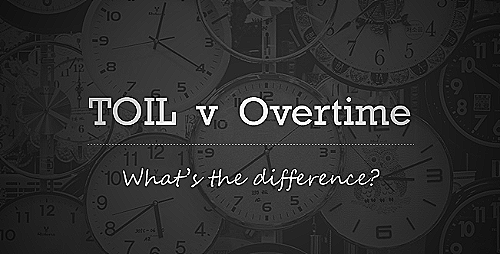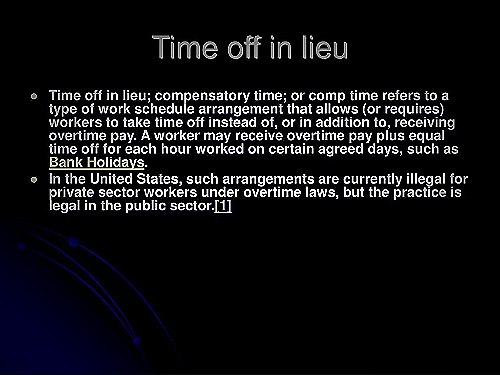Time Off in Lieu: What It Means and Why It Matters (2023)
Time off in lieu, also called time in lieu or TOIL, is an option given by employers to their employees as a way to compensate for overtime work through time off instead of pay. This practice has become increasingly important in modern workplaces as it promotes work-life balance and employee satisfaction while also being a more cost-effective option for employers.
In this article, we will explore the meaning of time off in lieu and its benefits for both employees and employers.
Check out this Youtube video to discover the meaning behind time off in lieu and its importance in the workplace. You don’t want to miss the insights shared in “TOIL: Time Off In Lieu – YouTube.”
The Meaning of Time Off in Lieu
Time off in lieu, also known as TOIL, is a system where an employee who has worked beyond their usual work hours can take time off instead of receiving monetary pay for the overtime. It is an alternative to traditional overtime pay, where the employee is compensated with money for the additional hours they have worked.
TOIL functions as an agreement between the employer and employee, and it is used as an incentive for the employee to complete additional work.
Time off in lieu is beneficial to both the employer and employee. With TOIL, the employee can balance their work and personal life better.
Instead of additional money, the employee can take off additional time, which is helpful for people who have family responsibilities or need to attend to personal issues. The employer benefits from the system by allowing the employee to be motivated to work harder and produce more work.
Moreover, it is often less expensive for an employer to give time off, rather than paying overtime.
Various industries use time off in lieu in different ways. For example, the healthcare industry often uses TOIL to maintain staffing levels during peak seasons, such as flu season.
The IT industry uses a flexible schedule, where employees can work in their preferred schedule, and any additional hours worked can be taken as time off in the future. In the construction industry, time off in lieu is often used during slow periods, where employees can work fewer hours, but maintain full pay by working beyond their normal hours.
TOIL vs Overtime Pay: Which is Better for Employees?
Time off in lieu and traditional overtime pay have different advantages and disadvantages, so the choice between the two depends on specific situations. With overtime pay, the employee is compensated financially for the additional work they have completed.
However, if the employee is looking for some additional time to spend with their families, time off in lieu might be the better option. With TOIL, the employee can take additional time off, which could lead to improved work-life balance.
Moreover, not all employees value additional time off, and many might prefer the monetary pay. TOIL might not be the right choice for employees who require additional money to cover for their expenses.
In conclusion, the choice between traditional overtime pay and time off in lieu depends on the specific needs and preferences of the employee. Employers should communicate the availability of TOIL to their employees and provide them with an option to choose.

Why Time Off in Lieu Matters in the Workplace
Time off in lieu or TOIL is an approach that encourages employees to work extra hours in exchange for additional paid time off instead of overtime pay. Offering time off in lieu is an essential factor in creating a positive workplace culture and retaining skillful employees.
It has benefits with regard to employee satisfaction and productivity.
Having time off in lieu policies create a sense of flexibility among employees, allowing them to have the option to take time off when needed. It can make employees feel more valued and motivated, and in return, can help improve employee satisfaction and engagement.
This can lead to increased productivity and efficiency, among other positive outcomes.
The Impact of Time Off in Lieu on Employee Productivity
Studies have shown that taking time off can have a significant impact on employee productivity. When an employee takes time off, they can recharge and rejuvenate, which will enable them to come back to work with a fresh mindset and energy.
This renewal of energy and motivation can greatly increase productivity and creativity, which will impact not only the individual employee but also the overall team’s productivity.
Successful companies have recognized the importance of time off in lieu policies and have implemented methods that work for their workforce. For instance, at Google, employees are allowed to take up to three months off for any reason, with little explanation required.
This approach has contributed to Google’s continued success in innovation and overall corporate culture.

Offering time off in lieu is an excellent way to improve workplace culture and communication. It fosters collaboration and teamwork among employees and helps reduce turnover rates.
When employees feel valued and appreciated, they are more likely to be productive and remain loyal to their organization. By understanding the impact of time off in lieu policies, employers can create a positive and productive work environment that benefits both the organization and its employees.
Implementing a Time Off in Lieu Policy In The Workplace
Time off in lieu is a popular policy implemented by many organizations. It refers to the offering of time off to employees who have surpassed their regular working hours.
Rather than accepting additional payment for overtime work, these employees can utilize the time in lieu as part of their annual leave.
If you’re planning to introduce a TOIL policy in your organization, consider the following guidelines:
1. Determine Your Policies and Guidelines
Your company should develop its policies and guidelines for time off in lieu, and then communicate them clearly to employees. It should cover the types of work eligible for time off in lieu, the amount of time allowed, and the time period during which it should be taken.
2. Ensure the Policy is Fair and Consistent
Ensure that your policy for awarding TOIL is fair and balanced for all employees regardless of their seniority, job status, or department. The same rules should apply throughout the company, as this level of consistency helps to promote a culture of equality and fairness.
3. Determine the Criteria for Eligibility
It’s important to determine the criteria for employee eligibility for time off in lieu, such as exceeding a particular number of hours of overtime work or reaching a specific level in the organization. This will help to stop any ambiguity or confusion among employees regarding who is eligible for time off in lieu.
FAQs about Time Off in Lieu
Here is a list of frequently asked questions about TOIL:
- Do employers have to offer time off in lieu?
- How is time off in lieu calculated?
- Can employees choose between time off in lieu and overtime pay?
- What happens to unused time off in lieu?
No, they do not. While TOIL is a popular practice in many organizations, it is not mandatory for all employers.
Time off in lieu is calculated based on the number of hours over the regular working hours that employees work. Usually, one hour of overtime work equals one hour of time off in lieu.
It varies from organization to organization. Employers can give employees the option to choose between time off in lieu and overtime pay, or they may restrict the option to one or the other.
Usually, unused time off in lieu is forfeited at the end of the year or any agreed-upon timeframe, as it is a benefit offered in exchange for hours worked.
Conclusion
Time off in lieu, or TOIL, is a valuable option for both employees and employers in the modern workplace. Rather than relying only on traditional overtime pay, offering time off in lieu as a form of compensation can provide workers with much-needed breaks and additional benefits.
Furthermore, allowing employees to accrue TOIL gives them greater flexibility in managing their own work-life balance. Studies have even shown that taking time away from work can have numerous health benefits.
By offering time off in lieu, employers can demonstrate their commitment to their workers’ well-being and productivity.

